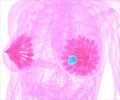Hormone therapy has a greater impact than chemotherapy on quality of life in women with breast cancer, finds a new study.

‘Quality of life is affected in women with breast cancer who were treated with hormone therapy, whereas the impact of chemotherapy is more temporary.
’
Read More..




The deleterious effects of chemotherapy are more transient. Given that current international guidelines recommend the prescription of hormone therapy for 5 to 10 years, it is important to offer treatment to women who develop severe symptoms due to hormone antagonist medication and to identify those who might benefit from less prolonged or intensive treatment strategies. Read More..
This work was directed by Dr. Inès Vaz-Luis, a specialist breast cancer oncologist and researcher at Gustave Roussy in the lab "Predictive Biomarkers and Novel Therapeutic Strategies in Oncology" (Inserm/Université Paris-Sud/Gustave Roussy).
"This analysis of the CANTO cohort shows for the first time that anti-hormonal treatments do not have lesser effects than chemotherapy on women’s quality of life. Quite the contrary, as the diminution in the quality of life which is noted at diagnosis, is still present two years later, whereas the impact of chemotherapy is more temporary," explained Dr. Vaz-Luis.
In this study, researchers measured the quality of life in 4,262 patients with localized breast cancer (stage I to III) at the time of diagnosis and at one and two years thereafter. The primary treatment for these patients was surgical and, for some of them, administration of chemotherapy and/or radiotherapy. About 75-80% of them then took hormone therapy for at least five years. Quality of life was measured using a tool that assesses general quality of life in patients with all types of cancer (EORTC QLQ-C30) combined with a tool more specifically designed for use in breast cancer (QLQ-BR23).
For the population studied as a whole, there was an overall deterioration in the quality of life at two years from diagnosis. This deterioration was greater in patients who had received hormone therapy, especially after the menopause. By contrast, chemotherapy had a bigger effect on the quality of life in non-menopausal patients, especially in terms of worsening of cognitive functions.
Advertisement
"It will also be important in the future to differentiate prior to treating patients who are at high risk of relapse from those at lower risk in order to tailor hormone treatment. This may be done to avoid escalation of anti-hormonal treatment in certain patients," concluded Dr Vaz-Luis, emphasising that "hormone therapy is extremely effective in treating breast cancer, resulting in a reduction by approximately 50% in the risk of relapse, and that the finding of adverse effects does not in any way put into question the excellent risk/benefit ratio of this treatment."
Advertisement















